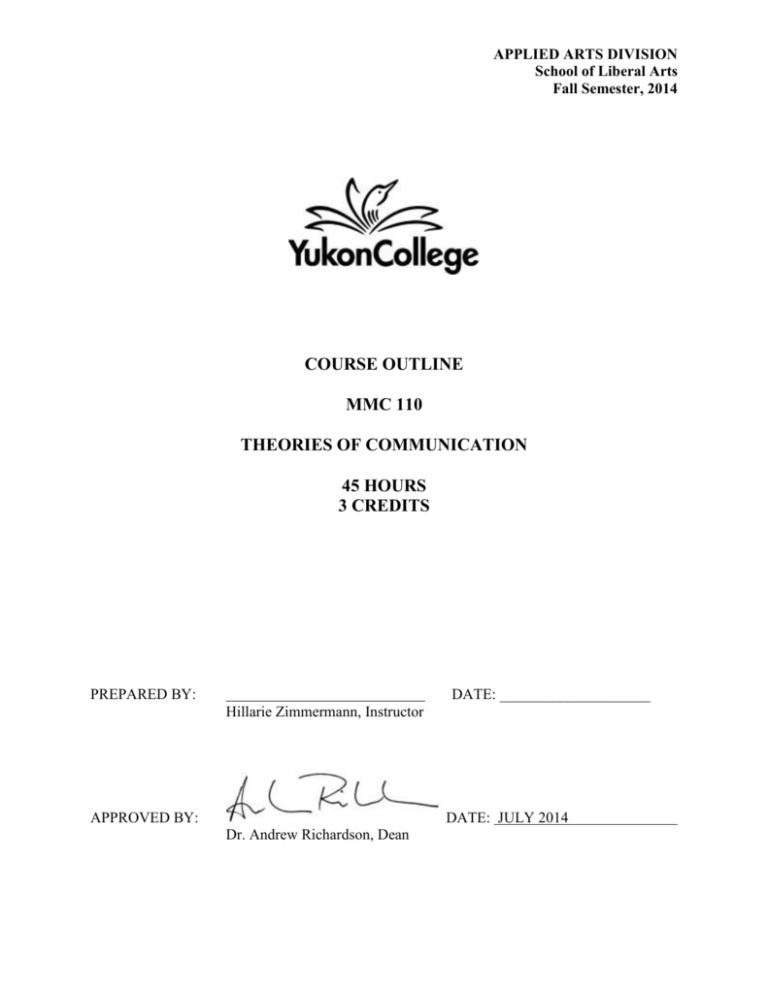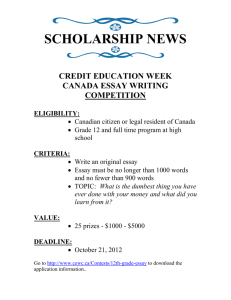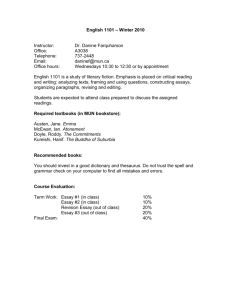
APPLIED ARTS DIVISION
School of Liberal Arts
Fall Semester, 2014
COURSE OUTLINE
MMC 110
THEORIES OF COMMUNICATION
45 HOURS
3 CREDITS
PREPARED BY:
DATE: ____________________
Hillarie Zimmermann, Instructor
APPROVED BY:
DATE: JULY 2014
Dr. Andrew Richardson, Dean
YUKON COLLEGE
Copyright July, 2014
All right reserved. No part of this material covered by this copyright may be reproduced or
utilized in any form or by any means, electronic or mechanical, traded, or rented or resold,
without written permission from Yukon College.
Course Outline prepared by Hillarie Zimmermann, July 2014.
Yukon College
P.O. Box 2799
Whitehorse, YT
Y1A 5K4
APPLIED ARTS DIVISION
Theories of Communication
3 Credit Course
Fall Semester, 2014
THEORIES OF COMMUNICATION
INSTRUCTOR: Hillarie Zimmermann
OFFICE HOURS: By appointment
OFFICE LOCATION: A2404
CLASSROOM: A2204
E-MAIL: hzimmermann@yukoncollege.yk.ca
TIME: Friday 1:00 pm - 4:00 pm
TELEPHONE: 668-8869
DATES: Sep. 5th - Dec 5th
COURSE DESCRIPTION
This is an introductory course to the theory behind mass media communication. In this course
you will have a chance to explore successful communication strategies and develop the
theoretical foundation needed to understand mass media communication and to conduct effective
communications research in the real world. Topics covered will include: analysis and brief
history of Canadian print, radio, sound recording, internet, film, television, and news media;
knowing and targeting an audience; advertising; public relations; media responsibility, and the
effects of mass media communication.
PREREQUISITES
None
LEARNING OUTCOMES
Upon successful completion of the course, students will be able to:
describe the major elements of the mass communication process, and see its effects on
diverse audiences
identify significant mass communication types and indicate their impact on people
recognize the forms, functions and audiences relevant to each major medium, including the
print, broadcast and film industries
discuss legal and ethical concerns in mass media
document sources used in research writing using A.P.A. format
DELIVERY METHODS/FORMAT:
This is mainly a classroom-based course. The instructor will facilitate the learning of new
concepts and theories using a student-centered delivery method. Student’s responses to case
studies will be used to facilitate discussion and ground theory in real world examples. Guest
speakers will help link course concepts to the local community. Classes will aim to be
interactive and varied. In order to cater to a variety of learners, lectures using video, print
visuals, audio and culminating group work will be employed along with student-led seminars.
You will participate in an online discussion forum that will be moderated and evaluated by the
instructor.
COURSE REQUIREMENTS/EVALUATION:
Attendance
Success in this course depends on attendance. It is your responsibility to take notes, to obtain
missed assignments, announcements or material handouts for any classes you have missed.
Demonstrated Student Leadership
Demonstrated leadership assessment is more effective than a general "class participation" grade.
As you perform specific course tasks, you show the instructor and the class that you are
improving your understanding of the discipline.
You may earn this 20 percent of your grade if you participate regularly in class and class
seminars and complete all homework on a timely basis.
Assignments/Test
Discussion/Reflection Papers
There are three short papers due during this course. Each paper is worth 10%, for a total of 30%
of your final mark. For the reflection paper, you are expected to take an idea or issue from the
course material and share your thoughts and reflections in a 2-page paper. For the discussion
papers, you are expected to take an issue or idea from the course material, do further
reading/research, and discuss your findings in a two page paper. These papers are due at the
beginning of the class for which they are assigned.
Student-Led Seminar
One of the best ways to learn is to teach other. Select a date to lead a 15- minute seminar and
facilitate class discussion on a current issue in the news and how it relates to the material being
covered in class. You will bring into class a "real-world" example from your own reading
(newsprint, magazine, online, etc.), viewing (film, television, etc.), or listening (radio, podcast,
etc.). These examples may raise such issues as the impact of technology on media, media
effects, impact of media on culture, media and ethical concerns, or any other issue that you can
demonstrate is relevant to the course. This project is worth 10% of your final mark.
Test
Final in-class test makes up 10% of your final mark.
Essay and Presentation
An essay and presentation make up the final 30% of the course (essay 20%, presentation 10%).
For your final essay, please submit a short proposal (1 page maximum) on a relevant course topic
no later than three weeks before the essay is due. The 1500 word essay and 15 minute
presentation are due on the last day of class.
NOTES: Written assignments are due at the beginning of the class for which they are assigned.
Late assignments will have 1% deducted for every day they are late. Assignments will not be
accepted more than 1 week after the due date. Please type and double-space all assignments.
Document all sources used with accurate citations; use A.P.A. style.
All assignments must be proofed and held to professional writing standards.
Please see the rubric for each assignment for a detailed description of specific marking criteria.
Evaluation
Deliverables
Assignments
Essay and Presentation
Demonstrated Leadership
% of Final Mark
50%
30%
20%
REQUIRED TEXTBOOKS/MATERIALS:
Vivian, J. (2012). The media of mass communication, eleventh Canadian edition. Toronto,
Ontario: Pearson.
OPTIONAL SUPPLIES
Computers are available for use at the college labs; it is not required that you own a computer.
However, it would be helpful if you purchase a USB flash drive to transfer files between
computers and to and from home.
PLAGIARISM
Plagiarism is a serious academic offence. Plagiarism occurs when students present the
words of someone else as their own. Plagiarism can be the deliberate use of a whole piece of
another person’s writing, but more frequently it occurs when students fail to acknowledge
and document sources from which they have taken material. Whenever the words, research
or ideas of others are directly quoted or paraphrased, they must be documented according to
an accepted manuscript style (e.g., APA, CSE, MLA, etc.). Resubmitting a paper which has
previously received credit is also considered plagiarism. Students who plagiarize material
for assignments will receive a mark of zero (F) on the assignment and may fail the course.
Plagiarism may also result in dismissal from a program of study or the College.
ACADEMIC ACCOMODATION
Reasonable accommodations are available for students requiring an academic
accommodation to fully participate in this class. These accommodations are available for
students with a documented disability, chronic condition or any other grounds specified in
section 8.0 of the Yukon College Academic Regulations (available on the Yukon College
website). It is the student’s responsibility to seek these accommodations. If a student
requires an academic accommodation, he/she should contact the Learning Assistance Centre
(LAC) at (867) 668-8785 or lassist@yukoncollege.yk.ca.
WRITING CENTRE
All students are encouraged to make the Writing Centre a regular part of the writing process for
coursework. Located in C2231 (adjacent the College Library), the Writing Centre offers halfhour writing coaching sessions to students of all writing abilities. Coaching sessions are available
in person and through distance technologies (e.g., email plus Skype or phone). For further
information or to book an appointment, visit the Centre's website:
www.yukoncollege.yk.ca/student_info/pages/writing_centre.
ACADEMIC CALENDAR COURSE DESCRIPTION
This course introduces the theory behind mass media communication. Students will explore
successful communication strategies and develop the theoretical foundation needed to understand
mass media communication and to conduct effective communications research in the real world.
Topics covered will include: the history of Canadian print, radio, sound recording, internet, film,
television and news media knowing and targeting an audience advertising and public relations
media responsibility and the effects of mass media communication.
SYLLABUS:
Date
Week 1,
Sept. 5
Week 2,
Sept. 12
Week 3,
Sept. 19
Week 5,
Oct. 3
Week 6,
Oct. 10
Week 7,
Oct. 17
Week 8,
Oct. 24
Introduction to Communications & Mass Media Literacy
Introduction to Mass Media
Mass Media Models
Media Convergence
Review Discussion Paper Rubric and Expectations
Review of MyYC
Law and Ethics
Ethics and social responsibility
Canadian Charter of Rights and Freedoms
Defamation
Copyright
Print Communications
History of newspapers in North America
Innovations from magazines
Applying techniques to address quality in print media
Sound Recording and Radio
Peer to peer sharing
Music quality analysis
Advertising
Demassification
Radio Programming
The Internet and Library Session
Uncovering scope and diversity of Internet content
Internet for commerce
Regulation and access
Film and Television
North America TV history, English/ French Canadian,
and First Nations programming
Censorship
Media Effects
Theories on Media Effects
Stereotypes in Mass Communication
Cultural Sensitivity
Social Issues, Bias
Research
Assessing potential audience and subject matter
Determining delivery medium
Surveys and audience analysis techniques
Deliverables
Reflection Paper
Discussion Paper
#1
Student-led seminar (choose a week)
Week 4,
Sept. 26
Topic
Week 9,
Oct. 31
Week 10,
Nov. 7
Week 11,
Nov. 14
Applied and theoretical research
Global Mass Media
Mass media and nation states
Arab media systems
Media and terrorism
China media
Final Essay
Proposal
News
Journalism and personal values
Gatekeeper responsibility
Embedded journalism
Mass Media and Governance
Canadian model of regulation
Politicking and media
Week 12,
Nov. 21
In-class test
Week 13,
Nov. 28
Public Relations and Branding
Establishing communication objectives
Establishing a budget
Dealing with media
Issuing press releases
Structure of PR agencies
Corporate Name, Logos
Advertising
Advertising agencies
Audiences
Brand names
Psychology and Advertising
Student Presentations and Peer Review, Course Evaluation
Week 14,
Dec. 5
Discussion Paper
#2
Test
Final Essay &
Presentation

![Submission 68 [doc]](http://s3.studylib.net/store/data/008000926_1-fed8eecce2c352250fd5345b7293db49-300x300.png)




